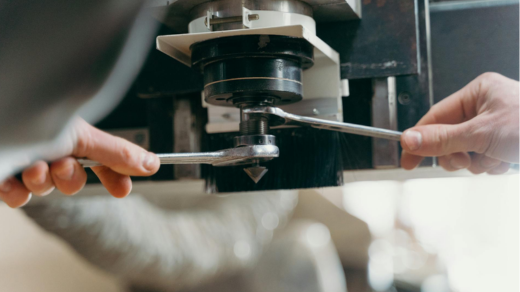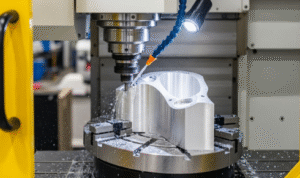In today’s rapidly evolving manufacturing landscape, precision and quality are paramount. Whether in aerospace, automotive, medical, or industrial applications, mechanical components must meet the highest standards of accuracy and durability. Precision CNC machining has become an indispensable technology in achieving these goals, allowing manufacturers to create complex, high-performance parts with incredible accuracy.
But how exactly does precision CNC machining enhance the quality of mechanical parts? Let’s explore the key benefits, technological advancements, and real-world applications that make CNC machining the gold standard for precision manufacturing.
1. Unmatched Accuracy and Consistency
One of the most significant advantages of precision CNC machining is its ability to produce parts with incredibly tight tolerances. Unlike traditional machining methods that rely on manual operation, CNC (Computer Numerical Control) machines use computer-aided design (CAD) and computer-aided manufacturing (CAM) software to execute precise, repeatable movements.
This digital precision eliminates human error and ensures that every part produced meets exact specifications. Whether it’s a complex aerospace component or a finely tuned medical device, CNC machining guarantees that each unit is identical to the last, ensuring uniformity across large production runs.
2. Superior Material Compatibility
Different industries require components made from a wide range of materials, each with unique properties. Precision CNC machining supports a vast selection of materials, including:
- Metals: Aluminum, stainless steel, titanium, brass, and copper
- Plastics: ABS, polycarbonate, PEEK, nylon
- Composites: Carbon fiber, fiberglass
This material versatility allows manufacturers to select the best material for their specific application, balancing factors like strength, weight, corrosion resistance, and cost. Additionally, CNC machining can handle hardened metals that traditional methods struggle to process, making it ideal for industries with high-performance requirements.
3. Exceptional Surface Finish and Detail
The quality of a mechanical part isn’t just about dimensions—it also includes surface finish and detail. CNC machines use high-speed cutting tools, advanced milling techniques, and multi-axis capabilities to produce parts with smooth surfaces and intricate features.
For applications where surface quality is critical—such as medical implants or aerospace components—CNC machining eliminates rough edges, burrs, and imperfections that can compromise performance. Post-processing options like polishing, anodizing, or powder coating further enhance the final product, ensuring it meets industry standards and aesthetic expectations.
4. Increased Production Efficiency and Speed
Speed is another area where precision CNC machining shines. Traditional manufacturing processes often require extensive manual labor, multiple setups, and long lead times. CNC machines, on the other hand, operate continuously and autonomously once programmed.
By reducing the need for manual intervention, CNC machining minimizes downtime and speeds up production cycles. Advanced multi-axis CNC machines can perform multiple operations in a single setup, eliminating the need for part repositioning and significantly reducing manufacturing time.
5. Cost-Effective and Scalable Production
While initial setup costs for CNC machining can be high, the long-term benefits outweigh the investment. Since CNC machines can operate with minimal human supervision and produce parts with near-zero waste, manufacturers achieve significant cost savings over time.
Additionally, precision CNC machining is highly scalable. Whether producing a single prototype or scaling up for mass production, CNC machining offers a flexible and cost-effective solution. This scalability is particularly beneficial for startups and industries that require rapid iterations before full-scale manufacturing.
6. Customization and Complex Geometries
Modern engineering challenges often require highly customized parts with intricate geometries. Precision CNC machining enables the production of:
- Complex internal structures
- Thin-walled designs
- High-precision threads
- Multi-material assemblies
With advanced 5-axis machining, CNC equipment can cut from multiple angles without requiring additional setups, making it possible to manufacture parts that would be impossible with traditional methods.
7. Enhanced Durability and Performance
Mechanical parts must withstand extreme conditions, including high stress, temperature variations, and exposure to corrosive elements. Precision CNC machining ensures that parts are manufactured to the highest durability standards, improving their lifespan and performance.
For example, in the automotive industry, CNC-machined engine components must endure intense heat and pressure. Similarly, in aerospace, turbine blades and structural components require exceptional strength-to-weight ratios. CNC machining delivers the precision and material integrity needed to meet these demanding conditions.
8. Reduced Waste and Sustainable Manufacturing
Sustainability is becoming a key focus in modern manufacturing. Traditional machining methods often result in substantial material waste due to inefficient cutting techniques. CNC machining, however, uses optimized tool paths and cutting strategies to minimize waste.
Additionally, CNC machines can be programmed to use materials efficiently, recycling excess material where possible. This not only reduces environmental impact but also lowers material costs, making precision CNC machining an eco-friendly choice for industries looking to minimize their carbon footprint.
9. Reliable Quality Control and Inspection
Quality control is critical in high-precision manufacturing. CNC machining integrates seamlessly with advanced quality control systems, including:
- Automated in-process inspections
- Coordinate Measuring Machines (CMMs)
- Laser scanning and optical measurement
These technologies ensure that every part meets the required tolerances and specifications before leaving the production line. By identifying defects early in the process, CNC machining reduces the risk of faulty components reaching the market, enhancing product reliability and customer satisfaction.
10. Integration with Industry 4.0 and Smart Manufacturing
The rise of Industry 4.0 and smart manufacturing has further enhanced the capabilities of precision CNC machining. Modern CNC machines are now equipped with IoT (Internet of Things) sensors, real-time monitoring, and AI-driven predictive maintenance.
This connectivity allows manufacturers to:
- Track machine performance in real time
- Predict and prevent equipment failures
- Optimize production schedules for maximum efficiency
By embracing these digital advancements, manufacturers can achieve even greater precision, efficiency, and cost savings, ensuring they remain competitive in an ever-evolving industry.
Conclusion: The Future of Precision CNC Machining
As industries continue to demand higher precision, efficiency, and durability, precision CNC machining will remain a cornerstone of modern manufacturing. Its ability to produce high-quality, custom components with minimal waste and maximum accuracy makes it an invaluable tool across numerous sectors.
Whether you’re in aerospace, automotive, medical, or industrial manufacturing, investing in precision CNC machining ensures that your parts meet the highest standards of quality and performance. To explore cutting-edge CNC machining solutions tailored to your needs, visit AP3D Custom and discover how precision engineering can take your production to the next level.





